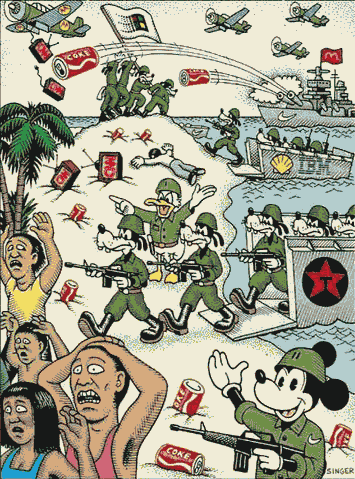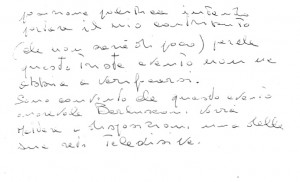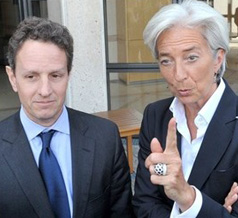By David Bromwich, Tomdispatch.com
Posted on July 22, 2009, Printed on July 23, 2009
http://www.alternet.org/story/141503/
On July 16, in a speech to the Economic Club of Chicago, Secretary of Defense Robert Gates said that the "central question" for the defense of the United States was how the military should be "organized, equipped -- and funded -- in the years ahead, to win the wars we are in while being prepared for threats on or beyond the horizon." The phrase beyond the horizon ought to sound ominous. Was Gates telling his audience of civic-minded business leaders to spend more money on defense in order to counter threats whose very existence no one could answer for? Given the public acceptance of American militarism, he could speak in the knowledge that the awkward challenge would never be posed.
We have begun to talk casually about our wars; and this should be surprising for several reasons. To begin with, in the history of the United States war has never been considered the normal state of things. For two centuries, Americans were taught to think war itself an aberration, and "wars" in the plural could only have seemed doubly aberrant. Younger generations of Americans, however, are now being taught to expect no end of war -- and no end of wars.
For anyone born during World War II, or in the early years of the Cold War, the hope of international progress toward the reduction of armed conflict remains a palpable memory. After all, the menace of the Axis powers, whose state apparatus was fed by wars, had been stopped definitively by the concerted action of Soviet Russia, Great Britain, and the United States. The founding of the United Nations extended a larger hope for a general peace. Organizations like the Committee for a Sane Nuclear Policy (SANE) and the Union of Concerned Scientists reminded people in the West, as well as in the Communist bloc, of a truth that everyone knew already: the world had to advance beyond war. The French philosopher Alain Finkielkraut called this brief interval "the Second Enlightenment" partly because of the unity of desire for a world at peace. And the name Second Enlightenment is far from absurd. The years after the worst of wars were marked by a sentiment of universal disgust with the very idea of war.
In the 1950s, the only possible war between the great powers, the U.S. and the Soviet Union, would have been a nuclear war; and the horror of assured destruction was so monstrous, the prospect of the aftermath so unforgivable, that the only alternative appeared to be a design for peace. John F. Kennedy saw this plainly when he pressed for ratification of the Nuclear Test Ban Treaty -- the greatest achievement of his administration.
He signed it on October 7, 1963, six weeks before he was killed, and it marked the first great step away from war in a generation. Who could have predicted that the next step would take 23 years, until the imagination of Ronald Reagan took fire from the imagination of Mikhail Gorbachev in Reykjavik? The delay after Reykjavik has now lasted almost another quarter-century; and though Barack Obama speaks the language of progress, it is not yet clear whether he has the courage of Kennedy or the imagination of Gorbachev and Reagan.
Forgetting Vietnam
In the twentieth century, as in the nineteenth, smaller wars have "locked in" a mentality for wars that last a decade or longer. The Korean War put Americans in the necessary state of fear to permit the conduct of the Cold War -- one of whose shibboleths, the identification of the island of Formosa as the real China, was developed by the pro-war lobby around the Nationalist Chinese leader Chiang Kai-shek. Yet the Korean War took place in some measure under U.N. auspices, and neither it nor the Vietnam War, fierce and destructive as they were, altered the view that war as such was a relic of the barbarous past.
Vietnam was the by-product of a "containment" policy against the Soviet Union that spun out of control: a small counterinsurgency that grew to the scale of almost unlimited war. Even so, persistent talk of peace -- of a kind we do not hear these days -- formed a counterpoint to the last six years of Vietnam, and there was never a suggestion that another such war would naturally follow because we had enemies everywhere on the planet and the way you dealt with enemies was to invade and bomb.
America's failure of moral awareness when it came to Vietnam had little to do with an enchantment with war as such. In a sense the opposite was true. The failure lay, in large part, in a tendency to treat the war as a singular "nightmare," beyond the reach of history; something that happened to us, not something we did. A belief was shared by opponents and supporters of the war that nothing like this must ever be allowed to happen to us again.
So the lesson of Vietnam came to be: never start a war without knowing what you want to accomplish and when you intend to leave. Colin Powell gave his name to the new doctrine; and by converting the violence of any war into a cost-benefit equation, he helped to erase the consciousness of the evil we had done in Vietnam. Powell's symptomatic and oddly heartless warning to George W. Bush about invading Iraq -- "You break it, you own it" -- expresses the military pragmatism of this state of mind.
For more than a generation now, two illusions have dominated American thinking about Vietnam. On the right, there has been the idea that we "fought with one hand tied behind our back." (In fact the only weapons the U.S. did not use in Indochina were nuclear.) Within the liberal establishment, on the other hand, a lone-assassin theory is preferred: as with the Iraq War, where the blame is placed on Secretary of Defense Donald Rumsfeld, so with Vietnam the culprit of choice has become Secretary of Defense Robert McNamara.
This convenient narrowing of the responsibility for Vietnam became, if anything, more pronounced after the death of McNamara on July 6th. Even an honest and unsparing obituary like Tim Weiner's in the New York Times peeled away from the central story relevant actors like Secretary of State Dean Rusk and General William Westmoreland. Meanwhile, President Richard Nixon and his National Security Adviser Henry Kissinger seem to have dematerialized entirely -- as if they did nothing more than "inherit" the war. The truth is that Kissinger and Nixon extended the Vietnam War and compounded its crimes. One need only recall the transmission of a startling presidential command in a phone call by Kissinger to his deputy Alexander Haig. The U.S. would commence, said Kissinger, "a massive bombing campaign in Cambodia [using] anything that flies on anything that moves."
No more than Iraq was Vietnam a war with a single architect or in the interest of a single party. The whole American political establishment -- and for as long as possible, the public culture as well -- rallied to the war and questioned the loyalty of its opponents and resisters. Public opinion was asked to admire, and did not fail to support, the Vietnam War through five years under President Lyndon Johnson; and Nixon, elected in 1968 on a promise to end it with honor, was not held to account when he carried it beyond his first term and added an atrocious auxiliary war in Cambodia.
Yet ever since Senator Joe McCarthy accused the Democrats of "twenty years of treason" -- the charge that, under presidents Franklin Delano Roosevelt and Harry Truman, the U.S. had lost a war against Communist agents at home we did not even realize we were fighting -- it has become a folk truth of American politics that the Republican Party is the party that knows about wars: how to bring them on and how to end them.
Practically, this means that Democrats must be at pains to show themselves more willing to fight than they may feel is either prudent or just. As the legacy of Lyndon Johnson and Bill Clinton attests, and as the first half year of Obama has confirmed, Democratic presidents feel obliged either to start or to widen wars in order to prove themselves worthy of every kind of trust. Obama indicated his grasp of the logic of the Democratic candidate in time of war as early as the primary campaign of 2007, when he assured the military and political establishments that withdrawal from Iraq would be compensated for by a larger war in Pakistan and Afghanistan.
We are now close to codifying a pattern by which a new president is expected never to give up one war without taking on another.
From Humanitarian Intervention to Wars of Choice
Our confidence that our selection of wars will be warranted and our killings pardoned by the relevant beneficiaries comes chiefly from the popular idea of what happened in Kosovo. Yet the eleven weeks of NATO bombings from March through June 1999 -- an apparent exertion of humanity (in which not a single plane was shot down) in the cause of a beleaguered people -- was also a test of strategy and weapons.
Kosovo, in this sense, was a larger specimen of the sort of test war launched in 1983 by Ronald Reagan in Grenada (where an invasion ostensibly to protect resident Americans also served as aggressive cover for the president's retreat from Lebanon), and in 1989 by George H.W. Bush in Panama (where an attack on an unpopular dictator served as a trial run for the weapons and propaganda of the First Gulf War a year later). The NATO attack on the former Yugoslavia in defense of Kosovo was also a public war -- legal, happy, and just, as far as the mainstream media could see -- a war, indeed, organized in the open and waged with a glow of conscience. The goodness of the bombing was radiant on the face of Tony Blair. It was Kosovo more than any other engagement of the past 50 years that prepared an American military-political consensus in favor of serial wars against transnational enemies of whatever sort.
An antidote to the humanitarian legend of the Kosovo war has been offered in a recent article by David Gibbs, drawn from his book First Do No Harm. Gibbs shows that it was not the Serbs but the Kosovo Liberation Army (KLA) that, in 1998, broke the terms of the peace agreement negotiated by Richard Holbrooke and thus made a war inevitable. Nor was it unreasonable for Serbia later to object to the American and European demand that NATO peacekeepers enjoy "unrestricted passage and unimpeded access" throughout Yugoslavia -- in effect, that it consent to be an occupied country.
Americans were told that the Serbs in that war were oppressors while Albanians were victims: a mythology that bears a strong resemblance to later American reports of the guilty Sunnis and innocent Shiites of Iraq. But the KLA, Gibbs recounts, "had a record of viciousness and racism that differed little from that of [Serbian leader Slobodan] Milosevic's forces." And far from preventing mass killings, the "surgical strikes" by NATO only increased them. The total number killed on both sides before the war was about 2,000. After the bombing and in revenge for it, about 10,000 people were killed by Serb security forces. Thus, the more closely one inquires the less tenable Kosovo seems as a precedent for future humanitarian interventions.
Clinton and Kosovo rather than Bush and Iraq opened the period we are now living in. Behind the legitimation of both wars, however, lies a broad ideological investment in the idea of "just wars" -- chiefly, in practice, wars fought by the commercial democracies in the name of democracy, to advance their own interests without an unseemly overbalance of conspicuous selfishness. Michael Ignatieff, a just-war theorist who supported both the Kosovo and Iraq wars, published an influential article on the invasion of Iraq, "The American Empire: The Burden," in New York Times Magazine on January 5, 2003, only weeks before the onset of "shock and awe." Ignatieff asked whether the American people were generous enough to fight the war our president intended to start against Iraq. For this was, he wrote,
"a defining moment in America's long debate with itself about whether its overseas role as an empire threatens or strengthens its existence as a republic. The American electorate, while still supporting the president, wonders whether his proclamation of a war without end against terrorists and tyrants may only increase its vulnerability while endangering its liberties and its economic health at home. A nation that rarely counts the cost of what it really values now must ask what the 'liberation' of Iraq is worth."
A Canadian living in the U.S., Ignatieff went on to endorse the war as a matter of American civic duty, with an indulgent irony for its opponents:
"Regime change is an imperial task par excellence, since it assumes that the empire's interest has a right to trump the sovereignty of a state... Regime change also raises the difficult question for Americans of whether their own freedom entails a duty to defend the freedom of others beyond their borders... Yet it remains a fact -- as disagreeable to those left wingers who regard American imperialism as the root of all evil as it is to the right-wing isolationists, who believe that the world beyond our shores is none of our business -- that there are many peoples who owe their freedom to an exercise of American military power... There are the Bosnians, whose nation survived because American air power and diplomacy forced an end to a war the Europeans couldn't stop. There are the Kosovars, who would still be imprisoned in Serbia if not for Gen. Wesley Clark and the Air Force. The list of people whose freedom depends on American air and ground power also includes the Afghans and, most inconveniently of all, the Iraqis."
And why stop there? To Ignatieff, the example of Kosovo was central and persuasive. The people who could not see the point were "those left wingers" and "isolationists." By contrast, the strategists and soldiers willing to bear the "burden" of empire were not only the party of the far-seeing and the humane, they were also the realists, those who knew that nothing good can come without a cost -- and that nothing so marks a people for greatness as a succession of triumphs in a series of just wars.
The Wars Beyond the Horizon
Couple the casualty-free air war that NATO conducted over Yugoslavia with the Powell doctrine of multiple wars and safe exits, and you arrive somewhere close to the terrain of the Af-Pak war of the present moment. A war in one country may now cross the border into a second with hardly a pause for public discussion or a missed step in appropriations. When wars were regarded as, at best, a necessary evil, one asked about a given war whether it was strictly necessary. Now that wars are a way of life, one asks rather how strong a foothold a war plants in its region as we prepare for the war to follow.
A new-modeled usage has been brought into English to ease the change of view. In the language of think-tank papers and journalistic profiles over the past two years, one finds a strange conceit beginning to be presented as matter-of-fact: namely the plausibility of the U.S. mapping with forethought a string of wars. Robert Gates put the latest thinking into conventional form, once again, on 60 Minutes in May. Speaking of the Pentagon's need to focus on the war in Afghanistan, Gates said: "I wanted a department that frankly could walk and chew gum at the same time, that could wage war as we are doing now, at the same time we plan and prepare for tomorrow's wars."
The weird prospect that this usage -- "tomorrow's wars" -- renders routine is that we anticipate a good many wars in the near future. We are the ascendant democracy, the exceptional nation in the world of nations. To fight wars is our destiny and our duty. Thus the word "wars" -- increasingly in the plural -- is becoming the common way we identify not just the wars we are fighting now but all the wars we expect to fight.
A striking instance of journalistic adaptation to the new language appeared in Elisabeth Bumiller's recent New York Times profile of a key policymaker in the Obama administration, Undersecretary of Defense for Policy Michele Flournoy. Unlike her best-known predecessor in that position, Douglas Feith -- a neoconservative evangelist for war who defined out of existence the rights of prisoners-of-war -- Flournoy is not an ideologue. The article celebrates that fact. But how much comfort should we take from the knowledge that a calm careerist today naturally inclines to a plural acceptance of "our wars"? Flournoy's job, writes Bumiller,
"boils down to this: assess the threats against the United States, propose the strategy to counter them, then put it into effect by allocating resources within the four branches of the armed services. A major question for the Q.D.R. [Quadrennial Defense Review], as it is called within the Pentagon, is how to balance preparations for future counterinsurgency wars, like those in Iraq and Afghanistan, with plans for conventional conflicts against well-equipped potential adversaries, like North Korea, China or Iran."Another quandary, given that the wars in both Iraq and Afghanistan have lasted far longer than the American involvement in World War II, is how to prepare for conflicts that could tie up American forces for decades."
Notice the progression of the nouns in this passage: threats, wars, conflicts, decades. Our choice of wars for a century may be varied with as much cunning as our choice of cars once was. The article goes on to admire the coolness of Flournoy's manner in an idiom of aesthetic appreciation:
"Already Ms. Flournoy is a driving force behind a new military strategy that will be a central premise of the Q.D.R., the concept of 'hybrid' war, which envisions the conflicts of tomorrow as a complex mix of conventional battles, insurgencies and cyber threats. 'We're trying to recognize that warfare may come in a lot of different flavors in the future,' Ms. Flournoy said."
Between the reporter's description of a "complex mix" and the planner's talk of "a lot of different flavors," it is hard to know whether we are sitting in a bunker or at the kitchen table. But that is the point. We are coming to look on our wars as a trial of ingenuity and an exercise of taste.
Why the Constitution Says Little About Wars
A very different view of war was taken by America's founders. One of their steadiest hopes -- manifest in the scores of pamphlets they wrote against the British Empire and the checks against war powers built into the Constitution itself -- was that a democracy like the United States would lead irresistibly away from the conduct of wars. They supposed that wars were an affair of kings, waged in the interest of aggrandizement, and also an affair of the hereditary landed aristocracy in the interest of augmented privilege and unaccountable wealth. In no respect could wars ever serve the interest of the people. Machiavelli, an analyst of power whom the founders read with care, had noticed that "the people desire to be neither commanded nor oppressed," whereas "the powerful desire to command and oppress." Only an appetite for command and oppression could lead someone to adopt an ethic of continuous wars.
In the third of the Federalist Papers, written to persuade the former colonists to ratify the Constitution, John Jay argued that, in the absence of a constitutional union, the multiplication of states would have the same unhappy effect as a proliferation of hostile countries. One cause of the wars of Europe in the eighteenth century, as the founders saw it, had been the sheer number of states, each with its own separate selfish appetites; so, too, in America, the states, as they increased in number, would draw external jealousies and heighten the divisions among themselves. "The Union," wrote Jay, "tends most to preserve the people in a state of peace with other nations."
A democratic and constitutional union, he went on to say in Federalist 4, would act more wisely than absolute monarchs in the knowledge that "there are pretended as well as just causes of war." Among the pretended causes favored by the monarchs of Europe, Jay numbered:
"a thirst for military glory, revenge for personal affronts; ambition or private compacts to aggrandize or support their particular families, or partisans. These and a variety of motives, which affect only the mind of the Sovereign, often lead him to engage in wars not sanctified by justice, or the voice and interests of his people."
When, thought Jay, the people are shorn of their slavish dependence, so that they no longer look to a sovereign outside themselves and count themselves as "his people," the motives for war will be proportionately weakened.
This was not a passing theme for the Federalist writers. Alexander Hamilton took it up again in Federalist 6, when he spoke of "the causes of hostility among nations," and ranked above all other causes "the love of power or the desire of preeminence and dominion": the desire, in short, to sustain a reputation as the first of powers and to control an empire. Pursuing, in Federalist 7, the same subject of insurance against "the wars that have desolated the earth," Hamilton proposed that the federal government could serve as an impartial umpire in the Western territory, which might otherwise become "an ample theatre for hostile pretensions."
Consider the prominence of these views. Four of the first seven Federalist Papers offer, as a prime reason for the founding of the United States, the belief that, by doing so, America will more easily avert the infection of the multiple wars that have desolated Europe. This was the implicit consensus of the founders. Not only Jay and Hamilton, but also George Washington in his Farewell Address, and James Madison and Benjamin Franklin, and John Adams as well as John Quincy Adams. It was so much part of the idealism that swept the country in the 1780s that Thomas Paine could allude to the sentiment in a passing sentence of The Rights of Man. Paine there asserted what Jay and Hamilton in the Federalist Papers took for granted: "Europe is too thickly planted with kingdoms to be long at peace."
Have we now grown too used to the employment of our army, navy, and air force to be long at peace, or even to contemplate peace? To speak of a perpetual war against "threats" beyond the horizon, as the Bush Pentagon did, and now the Obama Pentagon does, is to evade the question whether any of the wars is, properly speaking, a war of self-defense.
At the bottom of that evasion lies the idea of the United States as a nation destined for serial wars. The very idea suggests that we now have a need for an enemy at all times that exceeds the citable evidence of danger at any given time. In The Sorrows of Empire, Chalmers Johnson gave a convincing account of the economic rationale of the American national security state, its industrial and military base, and its manufacturing outworks.
It is not only the vast extent and power of our standing army that stares down every motion toward reform. Nor is the cause entirely traceable to our pursuit of refined weapons and lethal technology, or the military bases with which the U.S. has encircled the globe, or the financial interests, the Halliburtons and Raytheons, the DynCorps and Blackwaters that combine against peace with demands in excess of the British East India Company at the height of its influence. There is a deeper puzzle in the relationship of the military itself to the rest of American society. For the American military now encompasses an officer class with the character and privileges of a native aristocracy, and a rank-and-file for whom the best possibilities of socialism have been realized.
Barack Obama has compared the change he aims to accomplish in foreign policy to the turning of a very large ship at sea. The truth is that, in Obama's hands, "force projection" by the U.S. has turned already, but in more than one direction. He has set internal rhetorical limits on our provocations to war by declining to speak, as his predecessor did, of the spread of democracy by force or the feasibility of regime change as a remedy for grievances against hostile countries. And yet we may be certain that none of the wars the new undersecretary of defense for policy is preparing will be a war of pure self-defense -- the only kind of war the American founders would have countenanced. None of the current plans, to judge by Bumiller's article, is aimed at guarding the U.S. against a power that could overwhelm us at home. To find such a power, we would have to search far beyond the horizon.
The future wars of choice for the Defense Department appear to be wars of heavy bombing and light-to-medium occupation. The weapons will be drones in the sky and the soldiers will be, as far as possible, special forces operatives charged with executing "black ops" from village to village and tribe to tribe. It seems improbable that such wars -- which will require free passage over sovereign states for the Army, Marines, and Air Force, and the suppression of native resistance to occupation -- can long be pursued without de facto reliance on regime change. Only a puppet government can be thoroughly trusted to act against its own people in support of a foreign power.
Such are the wars designed and fought today in the name of American safety and security. They embody a policy altogether opposed to an idealism of liberty that persisted from the founding of the U.S. far into the twentieth century. It is easy to dismiss the contrast that Washington, Paine, and others drew between the morals of a republic and the appetites of an empire. Yet the point of that contrast was simple, literal, and in no way elusive. It captured a permanent truth about citizenship in a democracy. You cannot, it said, continue a free people while accepting the fruits of conquest and domination. The passive beneficiaries of masters are also slaves.
David Bromwich, the editor of a selection of Edmund Burke's speeches, On Empire, Liberty, and Reform, has written on the Constitution and America's wars for The New York Review of Books and The Huffington Post.
© 2009 Tomdispatch.com All rights reserved.
View this story online at: http://www.alternet.org/story/141503/











